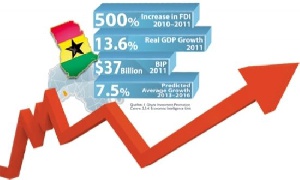 Fiscal indiscipline has been the main cause of economic mishaps in Ghana.
Fiscal indiscipline has been the main cause of economic mishaps in Ghana.
The International Monetary Fund (IMF) has approved additional US$94.2 million disbursement for the extension of the three-year US$918 million Extended Credit Facility programme for Ghana.
The credit facility which aimed at “restoring debt sustainability and macroeconomic stability in the country to foster a return to high growth and job creation, while protecting social spending” has had minimal achievement given the fact that many of the programme targets have not been met.
The new government’s decision to extend the programme is an indication to investors and the international community that Ghana is committed to macroeconomic stability and policy continuity. However, the extension window must be accompanied by prudent actions on the part of the government to strengthen revenue mobilization, prevent revenue leakages and institute public sector expenditure control measures.
Fiscal indiscipline has been the main cause of economic mishaps in Ghana. The associated corruption has eroded trust in government and public institutions. It has deprived the public sector of substantial revenues and prevented government from attracting the best talents in different sectors and departments.
The poor effective control on politicians and politically influential groups may lead to increasing benefits from gaining political power, and increasing economic injuries from not controlling such power. Some politicians and public officials accumulate large personal wealth in foreign bank accounts or in real estate assets abroad.
There is urgent need for public officials to avoid using political and administrative powers to allocate state possessions and income to themselves. The country can then make savings for development programmes and minimize the aid-driven interventions.
The president’s economic agenda of building ‘Ghana beyond aid’ and free of corruption is great, but requires unhindered efforts to prevent, detect, and sanction corruption appropriately. Any move to fight corruption must involve a holistic and coordinated approach to deal with the misuse of public office, tax evasion, accounting fraud and cross-border illicit money flows.
If Ghana does not institute measures for expenditure control, sound economic management and institutional strengthening devoid of corruption, the economy will always find itself in a bleak and dismal economic situation. This situation will put Ghana in stabilization episode that will definitely call for IMF’s assistance. IMF will always provide policy prescriptions for macroeconomic stability, so far as the economy is weak.
The IMF interventions are like medicine that may have detrimental side effects. IMF may be prescribing more or less of the correct dosage or may be unknowingly diagnosing an economy that is suffering from broken leg with quinine.
The IMF may not have adequate insight into the nature of shocks to be stabilized and the relevant institutional details and macroeconomic linkages.
The IMF programmes have little room for addressing issues, such as urbanization, industrialization, technical/vocational training, technology, research and development. These issues must now engage greater attention in policy-making in Ghana as it aspires to join the ranks of the fast growing economies.
It is time for the managers of the Ghanaian economy to think beyond IMF’s stabilization prescriptions and provide a clear policy direction as a platform upon which to stimulate economic growth as a means to poverty reduction. We need to work towards removing structural bottlenecks and increasing production instead of having too much faith in the ability of domestic production to respond to short-term prices.
There must be committed efforts on the part of the Government to review and strictly enforce the Public Financial Management Act, 2016 (Act 921) and the Public Procurement (amendment) Act 2016 (Act 914) to reduce waste in the Ghanaian economy. The public financial management review must include provisions on public hearing system that provides financial information to project beneficiaries.
The National budget and Metropolitan, Municipal and District Assemblies (MMDAs) composite budgets must be taken seriously by institutions charged with implementation. The inadequate co-ordination between the spending arms of the government and those responsible for overseeing the spending arms, results in deficit that lies at the bottom of macroeconomic stability in Ghana.
The Government’s debt re-profiling is an appropriate economic management strategy, given the mountainous nature of Ghana’s debt. Debt re-profiling will give government some time to sustain economic growth and get the debt commitments under control. It will stabilize the funding cost and locks creditors into the system should future losses occur.
But when debt re-profiling is used, the change in debt sustainability will still be determined by the success or failure of fiscal policy or growth-enhancing interventions in the country. The strategy delays repayments and does not lead to debt relief, so must be accompanied by successful fiscal and growth-promoting policies.
The Bank of Ghana must strengthen the credibility of the inflation-targeting process, develop the foreign exchange market and build strong financial sector to support growth and financial inclusion. The Banks must institute comprehensive and collaborative monitoring and supervision strategies to ensure that the credibility of the commercial banks are preserved.
There is the need for the government to set up a competent institution responsible for researching and documenting financial information and setting of fiscal policy indicators to guide fiscal policy planning and monitoring in Ghana
The challenges that Ghana has suffered in the march towards sustained economic growth and poverty reduction raise a number of fundamental questions about development approaches, policies and management in Ghana.
The fact that policy approaches have not led to sustained growth beyond the short term suggests that there is a critical need to think beyond IMF interventions and ensure that we remove the mote in our eyes when it comes to the management and implementation of economic policies.